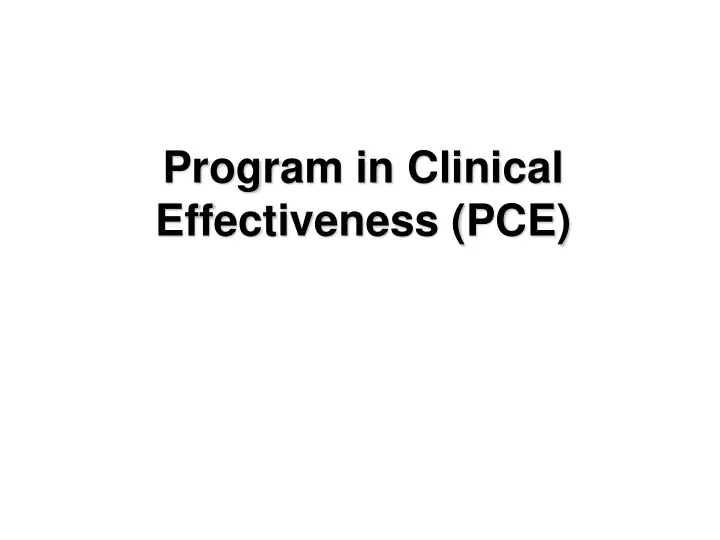

Program in Clinical Effectiveness (PCE)
Agenda • Introductions • History • Demographics of Class of 2019 • Courses • Survey of Graduates • HSPH Degree Options • Administrative Issues • Questions
History • 1986 – Planning Year • 1987 -First summer of courses – 13 students – 4 courses • Over 3600 students to date • Approx. 2000 returned for second summer • Approx. 75% from Harvard Teaching Hospitals
Demographics: Class of 2019 • 156 Students • 40% Male & 60% Female • 69% from Harvard Hospitals • 63% Fellows • 20% Faculty • 59% from U.S. – Australia, Brazil, Canada, Cote d’Ivoire, Colombia, Finland, Germany, Hungary, Ireland, India, Iran, Japan, Jordan, Lebanon, Malaysia, Nigeria, Norway, Philippines, Qatar, Russia, Rwanda, Serbia, Singapore, Sweden, Switzerland, Trinidad and Tobago, United Arab Emirates, United Kingdom, Uruguay
PCE Morning Courses Summer 1 (7/ 7-7/ 24) Summer 2 (7/ 27-8/ 14) I ntro to Clin Epi (EPI 208) I ntro to Biostat (BST206) Statistics for Medical Research I I (BST207) Statistics for Medical Research, Advanced (BST208)
PCE Afternoon Courses Sum m er 1 Sum m er 2 Methods and Applications in I mproving Health Care Health Services Research (HPM276) Quality (HPM253) I mplementation Research in Health and Methods for Decision Making Healthcare (HPM284) in Medicine (RDS288) Ethical Basis of the Practice of Research with Large Databases Public Health: Health Care (HPM299) Delivery (I D251) Linear and Longitudinal Decision Analysis in Clinical Regression (BST215) Research (RDS286) Effectiveness Research with Longitudinal Medical I nformatics (HPM512) Healthcare Databases (EPI 253) I ntroduction to Machine Learning (under development)
EPI 208 – Introduction to Clinical Epidemiology • Covers principles and methods used in traditional and clinical epidemiologic research • Course structure – Lectures and interactive in-class activities – Homework assignments and quiz – Project to apply methods to topic of interest • Small group workshops and presentations, individual office hours with faculty, and final paper (written as mini grant proposal)
BST 206/207/208 Introduction to Biostatistics • Covers – Principles: testing and confidence intervals – Presentation: graphics and summary statistics – Tests: parametric and non-parametric; two- sample, paired, anova, time-to-event, regression – Sample size and power – Software: SAS, Stata, R
BST 206/207/208 Introduction to Biostatistics • Course structure – Lectures – Software sessions • SAS (BST 206, Section 1 / BST 208) • Stata (BST 206, Section 2 / BST 207) • R (Optional Lab) – Literature reviews – Homework assignments and exams – Daily office hours – Joint data analysis project with Epi
20 th Anniversary Graduates Survey of Clinical Effectiveness Program • Performed in 2006/2007 by Mary Ellen Goldhamer – Former CLE student and fellow of Dan Singer • Protecting an endangered species: training physicians to conduct clinical research. Acad Med. 2009 Apr;84(4):439- 45. • 1,489 emails and letters sent • 73% response rate
Impact of PCE • 43% received grant funding for EPI208 research project • 64% indicated publication of EPI208 research proposal • 14% received grant funding for class project from afternoon courses • 30% indicated publication of class project from afternoon elective courses
Status at Time of Survey Response • Leadership roles – 6 Deans – 31 Department Chairs – 101 Division Chiefs – 236 Residency Program Directors – 193 Medical Directors – 19 CEO/CMO – 220 Hold administrative positions
Academic Degrees Following PCE • 76% completed or enrolled in degree program – 52% MPH – 24% MS – 3% Doctoral • 35% decided to pursue a degree that was not planned prior to attending PCE
Master of Public Health (MPH) in Clinical Effectiveness • Professional degree, 45 credits total – Summer-only and academic-year options (as well as online courses) • Further coursework in epidemiology, biostatistics, and core areas of public health (plus electives) • More info: – https://www.hsph.harvard.edu/admissions/degree- programs/master-of-public-health/fields-of-study/
Master of Science (SM) in Epidemiology • Research degree, 42.5 credits total – Summer-only and academic-year options (as well as online courses) • More advanced coursework in epidemiology and biostatistics (plus electives) • More info: – https://www.hsph.harvard.edu/epidemiology/prospective- students/master-of-science/ – https://www.hsph.harvard.edu/epidemiology/master-of-science- 42-5-credit-summer-only-curriculum/
Who Should Apply? • Physician researchers and other clinical researchers, fellows and faculty, who are seeking the quantitative and analytic skills needed for clinical or health services research, are encouraged to apply. • Local applicants must have a position in a clinical department in a Boston teaching hospital. • Applicants from outside of Boston must be recommended by their affiliated medical school or teaching hospital. • Typically PCE applicants have completed their medical residency training, however those who are completing a residency program which is greater than three years and includes time devoted to research training are also encouraged to apply. The PCE does not accept medical students. • The PCE encourages applications from individuals from minority groups.
Application Requirements & Deadline– Feb. 1 • PCE Application Supplement • SOPHAS Express Application, which includes: – $50 Non-Refundable Application Fee – Curriculum Vitae – Personal Statement • One page document addressing the reasons you wish to attend this program, your professional goals and why you feel that this program will be beneficial to you – Three Evaluations (Letters of Recommendation) • Recommendations should detail the applicant’s clinical ability and/or research potential • One recommendation should be from a division/department head verifying the applicant’s affiliation during the summer – Transcripts (Optional) (If submitting transcripts, scan unofficial transcripts and upload into application as one document) – Standardized Tests (Optional)
Tuition • The tuition rate is set annually in February. Historically the tuition rate increases approximately 3-8% annually. The 2019 tuition for completing the 15-credit PCE was $20,730 (based on the $1,382 standard credit tuition rate for non-degree, MPH and SM1 students). Expenses for textbooks and other course materials are not included in this amount. • For more information about tuition and billing please contact the Office of Student Financial Services at osfs@hsph.harvard.edu or (617) 432-1867
Contact Us! Lindsay Goldfarb, MPH Program Coordinator ProgClinEffect@partners.org (617) 525-3199
Questions?
Recommend
More recommend